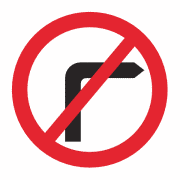While I was checking links for that story about the learner who accidentally killed her mother, I came across this one from February (which I somehow missed at the time).
 A father was being given a driving lesson by his wife, and they had their 4 year old daughter in the back. His satnav – an old one – told him to take a right turn across a 60mph road. Their car was t-boned by a car coming the other way and the 4-year old girl was killed.
A father was being given a driving lesson by his wife, and they had their 4 year old daughter in the back. His satnav – an old one – told him to take a right turn across a 60mph road. Their car was t-boned by a car coming the other way and the 4-year old girl was killed.
The road signs clearly and copiously say “NO RIGHT TURN”, but older satnavs don’t contain the correct information.
Obviously, a very tragic story. The inquest decided that there was no point pressing charges, even though the driver was clearly and definitely in the wrong – a perfectly sensible decision.
However, you can’t help but think about the issue of blame and responsibility (let’s imagine no one was killed and those involved were other people, just to remove the emotion here). After all, at least one person in the car was an allegedly qualified driver, and ignoring road signs is a major hazard these days for the rest of us. It couldn’t have been much of a driving lesson in terms of quality if this sort of thing was the outcome, or if they were using a satnav in the first place.
I can hear the pedants out there already, screaming: “But teaching people to use a satnav is important”. Yes, but that is almost certainly not what was happening here. If it was, the whole situation becomes ten times more serious because of the obvious ignoring of road signs involved.
Around this way, there is a NO RIGHT TURN junction on the A60 into Ruddington. It is on a blind bend, there are double white lines and a hatched region. There are appropriate signs. The speed limit is 40mph. And yet there are certain people who interpret NO RIGHT TURN as only applying to non-residents or those under the age of 60 – a handful of them use it regularly (along with a smattering of white van men who have added the inability to read road signs with pictures to their overflowing toolbox of poor literacy).
I’m always surprised at how tragedies involving children usually don’t delve into what is likely to be the usual behaviour of those involved. Like routinely taking such illegal or dangerous routes.
Maybe the authorities ought to consider that if you don’t penalise people for breaking the rules (and the law) more and more of them start to assume it is OK to do it. Not prosecuting someone for the accidental death of their own offspring is one thing, but banning them from driving due to clearly dangerous behaviour likely to impact others is another matter entirely. After all, you can’t bring a deceased child back – but you CAN do something about not adding anyone else’s to the list!